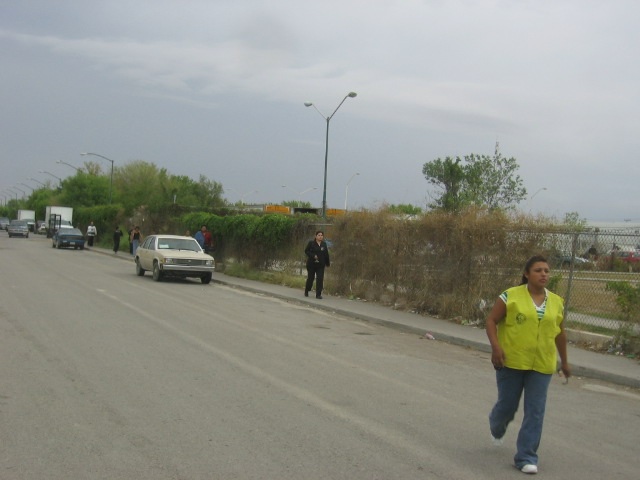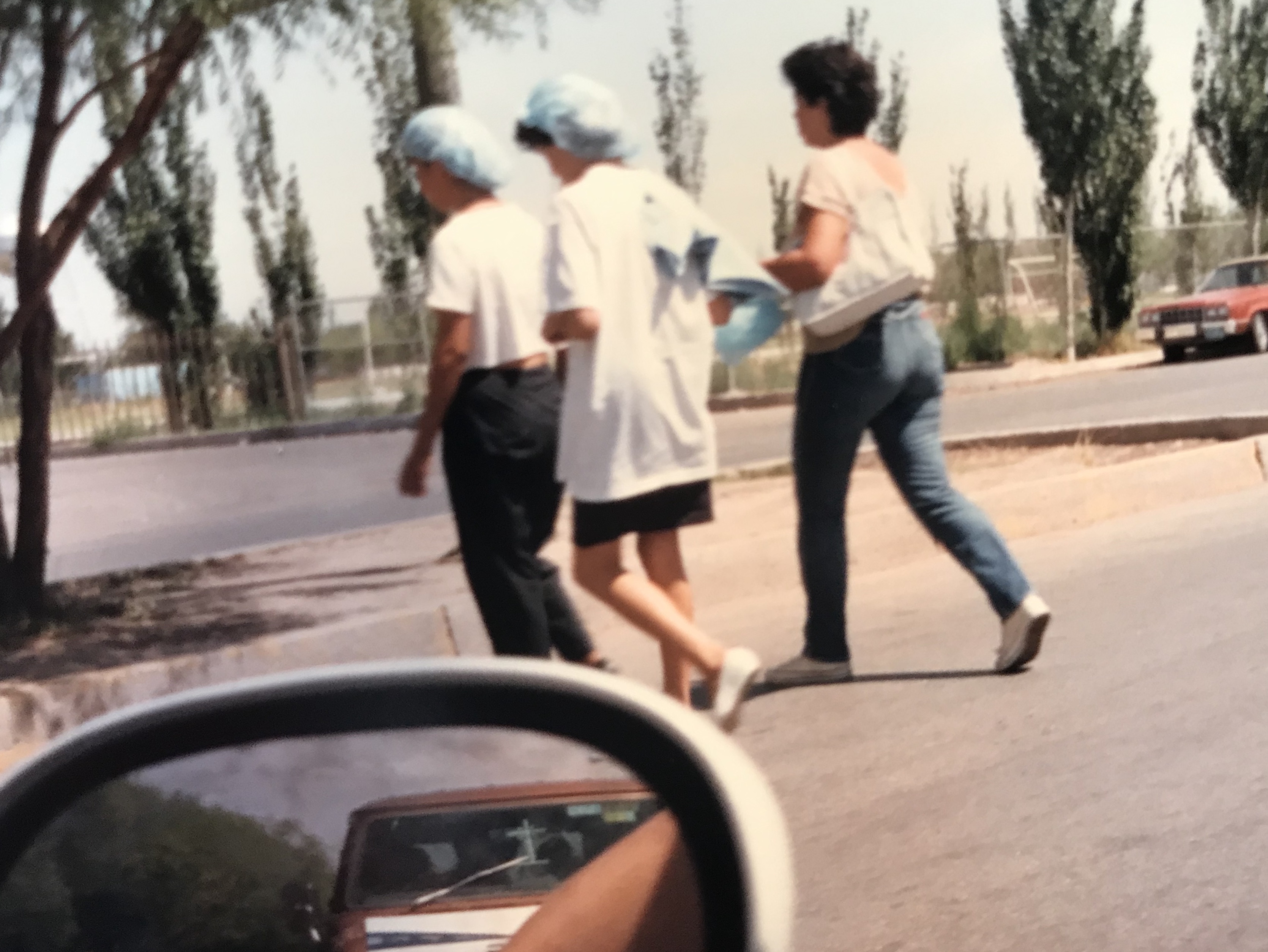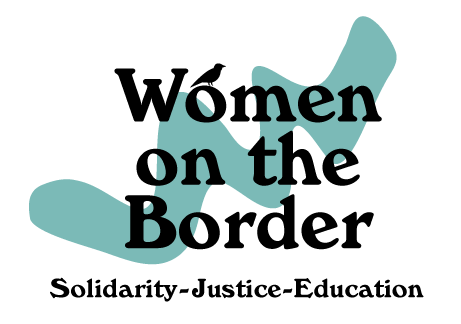Poetry
Conversations About Home (at the Deportation Centre)
Read by Warsan Shire

This Poem is a Diaper
This poem is the forearms on the table of a friend listening to MutaBaruka, Archibald, Judith and Diane.
This poem is a gift bag stuck together by someone at the assembly line table.
This poem could care less what gift is stuffed in this gift bag poem.
This poem makes life hard on the assembly line table in Rio Bravo.
This poem has its hand on your breast and leers in your eyes as you try to stick together the gift bag on the assembly line table.
This poem won’t allow you to go to the bathroom.
This poem could care less you are bursting and tired.
This poem is a diaper worn by a woman working at an assembly line table.
This poem says why are you taking so many breaks from this poem.
This poem is your blood-full pad that proves why you are taking so many breaks from this poem.
This poem is the welt on your cheek where this poem struck you hard for laughing when you showed your blood-full pad.
This poem thinks it needs a drink probably to get through this poem.
This poem is your friends’ laughter as you tell them about your blood-full pad in this poem’s face.
This poem returned to work the following day.
This poem is the smile that rose under the welt on this poem’s cheek as you remembered this poem’s friends.
This poem was fired and this poem quit at the same time.
This poem never quit.
This poem is a book that is thrust in your hand and says all of this poem is illegal.
This poem is the whisper that rises and chants under welts across the planet to form a big movement of these poems.
This poem is a house burning down for talking about this poem.
This poem is an inner tube carrying people quietly across the river.
This poem is how it was then and how it is now.
This poem is a dark car racing to the border on a night with no street lamps.
This poem walks across the border with a flash light and speeds away to tell about this poem.
This poem is a sigh of relief.
This poem found out life is hard on the assembly line table.
This poem wonders why you’d ever use prose to get across this poem.
This poem is a text message and this poem can talk to workers in China, Korea, Honduras, and Brazil.
This poem is a date on the calendar to vote about a union for this poem.
This poem changes the date for no good reason and changes it again.
This poem is on strike against this poem.
This poem is a calendar with days that don’t shift away from this poem.
This poem is a union formed by assembly line workers on a particular date on the calendar.
This poem is a new policy.
This poem is passed by all houses, ratified by all presidents, and shored up by this poem written by high courts across the whole planet.
This poem is a new way of interacting.
This poem is relaxing a little.
This poem is laughter on the buses, on all the buses across the planet.
This poem is laughter in the bar, in all the bars across the planet.
This poem is laughter in the coffee house, in all the coffee houses across the planet.
This poem is herbal tea sipped slowly at night time.
This poem is a flashback to rain on a jail cell’s metal roof in San Salvador.
This poem of rain is so loud on the metal roof that you can’t hear if someone could be coming across the courtyard outside.
This poem sings Mother Mary come to me and feels better.
This poem is changing.
This poem is moving forward.
Donna Hoffman, Austin, TX, 5/31/2013
My information and perspectives in this poem come from participating in the solidarity movements for peace and justice in Central America during the 1980’s and for labor rights in Texas, upstate New York, Ireland, and on the Mexican border with Austin Tan Cerca de la Frontera.
Poem: (Second) Request for ICE to Return Book
Cien Años de Soledad
Remains outstanding
I only now noticed
That Cesar is gone, too.
I didn’t know him.
We only discussed
Gabriel Garcîa Marquez
And what it meant to be owned by a story
Knocked over by its tsunami
and dragged across the shoreline.
Return the book
To any school library
So I can know
It’s safe.
@Jill Brady, Austin, Texas (2019). Ms. Brady is a librarian in an AISD public high school.


Maquila Zoned Out (poem)
Crushing
Citizens also
Who are ignorant and not
Of the ironic embrace
Of the dizzying pace
of the twin plants’
patterned
economic growth
In one more city seduced
By the dream of
The “package deal” of boom trade
Maquila zones of prosperity
That have forged in this part of the world
Paths that die in the desert
Surrounded by silently
Weeping mountains
El paso a la muerte
Danger
Danger
Danger
To Women
Young and old
Victims both
One kind to the violence
By men who stalk them
For inhabiting the young female body
Their mothers and fathers equal victims of the
Tragedy and horror of losing a daughter sister wife to
sexual terrorism
Assaulted by haunting images of
A loved one’s last few
Hours and minutes of
A stolen life
And of a youthful beauty
Tortured
Maimed
Raped
And brutally burned
And killed
Meanwhile my own
Image of silent screaming
And wanton abduction
Occurring in the day or night
Is permanently etched in my tired
And frightened mind
I find myself suspiciously staring
At presumed terrorists
Inhabiting male bodies
And directing my silent
Raging stares
At clean bodies
And suited men in elegant ties
The other terrorists
I charge
Those capable of crippling
Governments and countries
With an offer to sign here
On the dotted line
And welcome to free trade
Licentious trade
The wonders of working
Your poorest citizens into legal slavery
And sending their children
Into early graves
Yes
The indifferent terrorist
Selling his country’s and
His company’s wares
His cheap wages
To a cheapened and
Once loved culture
Of safety and simplicity
We once knew in Old Mexico
The Mexico he only sees through
The lenses of ancient class divisions
And bigotry
The Mexico one President
Must salvage from international shame
While the other curries favor
To the immigrant labor he must
At once welcome in his own country and blame
Yes these are the terrorists
Fighting global wars
Pressuring nations with
Candy bars and iron sticks
Never stopping to think
Oh not at all
Of the part they play
Big or small
In this nightmare of a time
To be a woman and to be living and working
On the border
In the horror chambered
Export processing zone
Elegant terrorists who with their complacency have violated spaces of privacy
Corners of safety
Valleys of desire, need and despair
The terrorist in a blue suit checking into fancy hotels
Holding business meetings aimed at neighborly mutual profit as they ignore the symbols of poverty knocking at the door
Never to be made part of the conversation
Other than to ask for
Another clean towel
On which to wipe the
Dainty sweat of working
Hard to ignore
The chant and plaintive cry of the young dead women’s families
Who ask but Why?
Who demand that all that could be done
Will be done
When a woman welcomed
To be their workers
Might be honored
And reclaimed in spirit and name
If not in her rotting remains
By the man in that thousand dollar suit
Who helped to recruit
Her innocence and her labor
Her lethal trust and confidence
For a cheap little wage that to her
Was a small liberation from
Poverty and despair
When in fact iit sent her
Daily walking to a factory to and fro until one day
Approaching it
Or headed home
She was met
By bloodthirsty
Depravity who drove
Her to a desert
And the Palace of Crime
Erected in the devil’s playground
In Ciudad Juarez’
Exploit and murder
processing zone.
Elvia Arriola April 27, 2002
Border crossing
I’ve crossed American soil
The fine line that divides poverty between the land of opportunity
I’ll always remember my Mexican sisters across the border, but will I practice what they preach?
Or pretend I’m someone I’m not cut out to be?
Forget my identity and sell my culture
For more money, more power
Y todo para qué?
For white recognition and my goals met
Because when I cross the border all anyone sees is a nopal on my forehead
And when I’m in Mexico all they see is proud to be an American
Because they’ve oppressed my ancestors and this is why they fight
For their children to have a better life
Yet, I’m already living the American Dream and still don’t feel white
A Xicana girl living in a “i’m not good enough” world
Lost in my own identity with a foot in each door
But, this is why solidarity exists
To break down power structures
And stand together, in justice and peace
For a better world to exist
I am Mexican American
And no one can take this from me
Born into a cruel world, but we are all human beings
This is our commonality that lets us stand in solidarity.
Priscilla Luera, Austin, Texas October 2016

